Insights from Italy’s ReHousIn Policy Lab to tackle housing-related impacts of green transition
The first Policy Lab of the ReHousIn research project in Italy was held in two sessions (one in Assisi, hosted by the Assisi Municipality, and one at Politecnico di Milano in Milan) bringing together stakeholders from the cities selected for case studies – Assisi, Reggio Emilia and Milan.
A great discussion filled with valuable inputs took place among the invited participants of diverse professional backgrounds: city and regional civil servants and representatives, technical experts, local stakeholders, private sector representatives, civil society organisations, practitioners and academics.

A total of 43 participants were broken into 5 working groups, with an excellent mix of competences, roles and profiles each, which fostered a vivid discussion and set the foundation for an informal network of relevant actors. The discussion was driven by the main research questions that would lead the upcoming field work: "How and to what extent ecological transition programmes, measures, and policies benefit housing conditions, influence housing affordability and accessibility? Which are the drivers and the implications of energy-retrofitting, urban regeneration, densification and nature-based solutions?"
The Policy Lab led to an exchange of insights by stakeholders on how green policies impact housing situations, with all the potential opportunities and challenges they bring, however, it was emphasised that such policies can deepen inequalities when they benefit largely to homeowners and urban centres, while public housing residents, low-income households and rural areas are often excluded due to systemic, informational, and financial barriers. A thought-through urban planning and public actors bring hope in mitigating these imbalances, if a sufficient attention is given to tending to obsolete public housing stock, regional inequalities, and lack of integration between energy and mobility strategies.
Publishing date:
